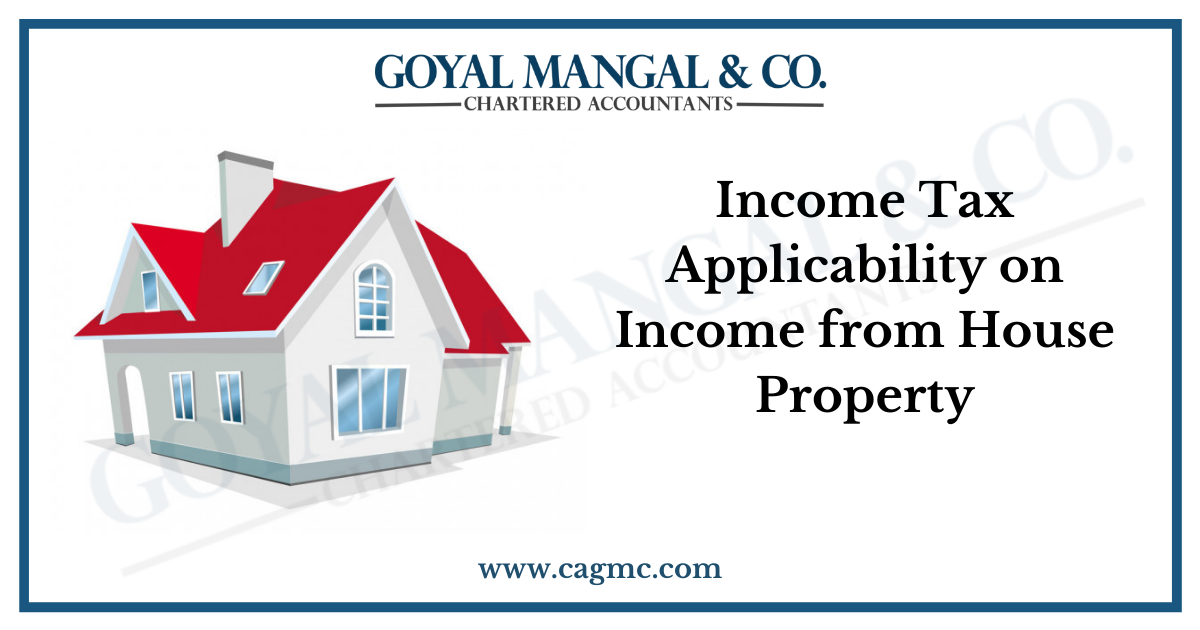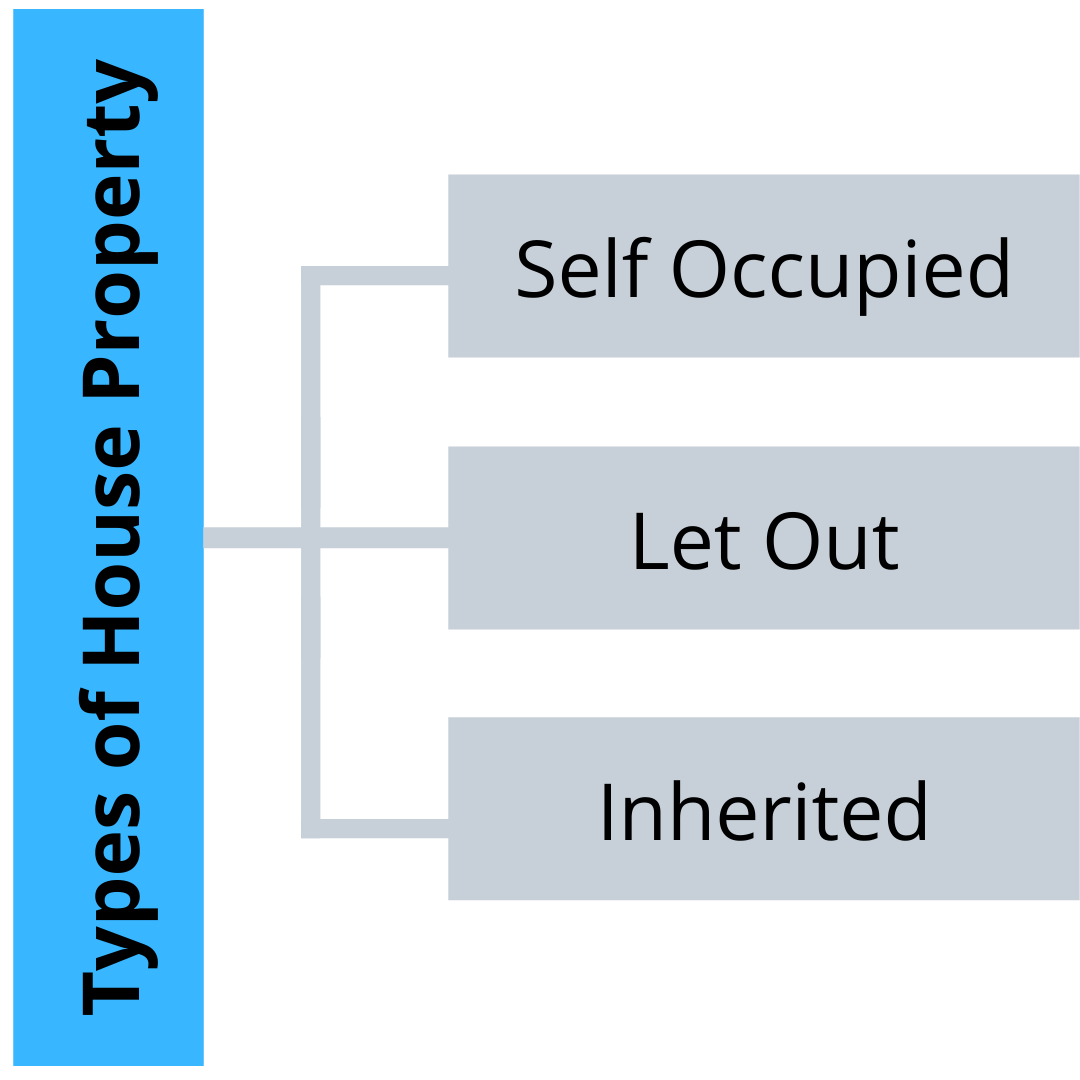What is House Property?
As per the Income-tax Act, 1961 house property means any building or a land adjacent to the building owned by the assessee himself. House property includes flats, shops, offices, factory sheds, commercial building, agricultural land and farm houses etc.

Types of House Property

Self-Occupied House Property
Self-occupied property is that house property which is used by the person who owns it. That means Self-occupied property is used and owned by the same person.
From FY -19-20 and onwards, you can declare two houses as a self occupied property which was previously for one property
Let-out house Property
A house property which is given on rent (a part or whole) by its owner for a period. The income from such property is chargeable to tax under income tax Act.
Inherent house property
An inherited property i.e. one bequeathed from parents, grandparents or ancestors which may beself occupied or may be rented by the owner.
How to calculate taxable income from House property
| Particulars | Amount |
| Gross annual value | A |
| (-) Municipal tax | B |
| Net annual value (A-B) | C |
| (-) Standard deduction
30% of NAV Interest on borrowing for making house property |
D |
| Taxable income from property (C-D) | E |
Calculation of Gross Annual Value of Property
Annual value of the house property consists of following factors:
- Actual rent received or receivable: The rent which is received or receivable by the owner of the house property on the let out part of the house property is Actual rent
- Municipal value: The value of the house determined by the Municipal authorities for levying Municipal taxes on house property is Municipal value. Municipal authorities normally charge house tax/property taxes on the basis of annual letting value of such house property.
- Fair rent: Fair rent is the rent which is rent of the similar property in the area, if it is let out for a year.
- Standard rent: The standard rent is the rent which is fixed under Rent Control Act. If the standard rent has been fixed for any property under the Rent Control Act, the owner cannot be expected to get a rent higher than the standard rent fixed under the Rent Control Act.
- Expected rent: Expected rent is the higher value among municipal value and fair rent subject to a maximum of Standard rent.
| Particulars | Amount |
| Fair Rent | A |
| Municipal Value | B |
| Higher of A and B | C |
| Standard Rent | D |
| Expected Rent (Lower or C and D) | E |
| Actual Rent | F |
| Gross Annual value (Higher of E and F) | G |
Note: under self occupied property Gross Annual Value is Nil
Deductions under Income from House Property
| 1. Municipal Taxes
2. Standard Deduction U/s 24(a) 3. Interest on Borrowed Capital U/s 24(b) |
- Municipal Taxes : Municipal taxes and any service-taxes which are levied by any local authority in respect of house property is allowed as deduction, if taxes are borne and actually paid by him during the year.
- Standard Deduction U/s 24(a) : Standard deduction of 30% of the annual value of the property
- Interest on Borrowed Capital U/s 24(b) : Maximum amount of interest on borrowing for construction, repair, renewed or reconstruction of house property under income tax Act is Rs. 30,000 but that can be exceeded to the amount of 200000 if owner of the property fulfills the following conditions:
-
- Property has been acquired or constructed on or after 1 April 1999
- Such acquisition or construction should be within the 5 years from the end of financial year in with money has borrowed
Deduction Under section 80EE
Deduction under section 80EE is an additional deduction in respect of interest on loan taken by individual for acquisition of residential house property. Please note that the individual should not have any other self occupied property in order to claim deduction under this section.
Condition for claiming deduction
- Value of the house should not exceed 50lakhs
- Loan should sanctioned during the year 2016-17
- Amount of loan sanctioned should not exceed 35lakhs
- The assessee should not own any other residential house on the date of sanction of loan
The benefit of deduction amounting to Rs. 50,000 is available under this section for interest payable on loan. Deduction under this section is over and above the deduction under Section24.
Deduction Under section 80EEA
A new section 80EEA is added to extend the tax benefits for individual of interest deduction amounting to Rs. 1,50,000 for housing loan.
- Housing loan must be taken from a financial institution or a housing finance company for buying a residential house property.
- Stamp duty value of the house property should not exceed 45lakhs.
- The taxpayer should not own any residential house property as on the date of sanction of the loan.
- Loan should be taken during the period 1 April 2019 to 31 March 2020.
- The individual taxpayer should not be entitled to deduction under section 80EE.
This deduction is over and above the deduction under section24
Maximum deduction under section 80EEA is Rs. 1,50,000 i.e. over and above 200000 that can be claimed by the assessee under section 24.
For repayment of borrowed money Under section 80C
The amount of Stamp duty and registration charges can be claimed as deduction under section 80C.Deduction for house property use for commercial purpose is not allowed under this section. Maximum deduction provided under section 80C is 150000.
Tax benefit to Joint owner
Joint owner can claim deduction of interest on borrowed money up to 2,00,000 individually. And deduction on principal repayments, including a deduction for stamp duty and registration charges under Section 80C within the overall limit of Rs.1.5lakh for each of the joint owners. The co-owner must be co borrower of the house.
Frequently Asked Question
Que. Is sub-letting of house property is charged under the head income from house property?
Ans. No, income from subletting will not eligible to get taxable under “income from house property” head, it will be chargeable under “income from other source” or “income from business or profession”.
Que. Is rental income can be chargeable in the hand of a person who is not a legal owner of the property?
Ans. Yes, under some situation even if you are not a legal owner of the property but liable to give the income tax on such rental income this is called deemed ownership. The person under the following cases deemed to be the owner of the house:
- If an individual transfers his or her house property to his/her spouse (not being a transfer in connection with an agreement to live apart) or to his/her minor child (not being married daughter) without adequate consideration (in terms of money), then the transferor will be deemed to be the owner of the property.
- Holder of impartible estate is deemed as the owner of the property comprised in the estate
- A member of co-operative society, company or other association of persons to whom a building (or a part) is allotted or leased under house building scheme of the society, company or association, as the case may be, is treated as deemed owner of the property.
- A person acquiring property by satisfying the conditions of section 53A of the Transfer of Property Act, will be treated as deemed owner (although he may not be the registered owner). Section 53A of said Act prescribes following conditions:
- There must be an agreement in writing.
- The purchase consideration is paid or the purchaser is willing to pay it.
- Purchaser has taken the possession of the property in pursuance of the agreement.
- In case of lease of a property for a period exceeding 12 years (whether originally fixed or provision for extension exists), lessee is deemed to be the owner of the property. However, any right by way of lease from month-to-month or for a period not exceeding one year is not covered by this provision.
Que. I have a shop which I given on rent, under which head this income will going to be taxable?
Ans. Rental income from shop is also taxable under the head income from house property.
Que. Can I take loan amount deduction for construction of my shop?
Ans. No, deduction for loan amount under section 80C is only for residential purpose and not for commercial purpose.
Que. Is arrear rent is taxable?
Ans. The part of arrear rent or unrealized rent will be taxable in year in which you receive the rent.
Que. What is the difference between arrear rent and unrealized rent?
Ans. Arrears of rent means the rent pertaining to prior years received in the current year. It could be due to reasons like “Increase in rent with retrospective effect” and the case is due in the court.
Unrealized Rent is the rent you couldn’t realize from your tenant for any other reasons like absconding of tenant or any other.
Que. Can I take deduction from arrear rent or unrealized rent?
Ans. Provision for taxability of arrear rent and unrealized rent is same under section 25A when arrear rent or unrealized rent is taxable it is eligible to get standard deduction of 30%.


